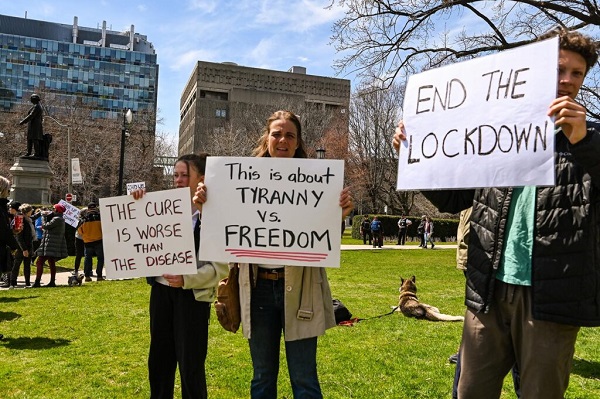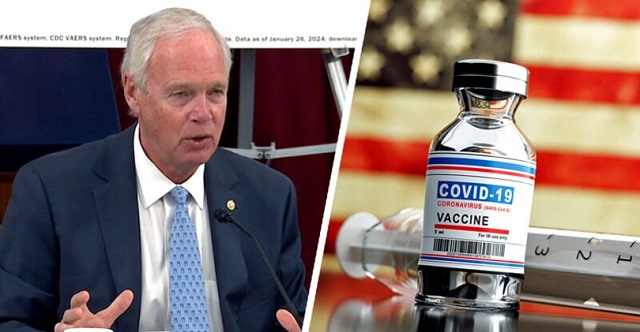COVID-19
Saskatchewan protestors ask Supreme Court to hear their challenge to gathering restrictions

News release from the Justice Centre for Constitutional Freedoms
The Justice Centre for Constitutional Freedoms announces that Jasmin Grandel and Darrell Mills intend to take their constitutional challenge to Saskatchewan’s Covid gathering restrictions to the Supreme Court of Canada. On May 15, 2024, the Saskatchewan Court of Appeal dismissed their case. Today, our lawyers applied for leave to appeal their case to Canada’s highest court in a potentially precedent-setting case about the freedom of peaceful assembly.
On December 19, 2020, Ms. Grandel and Mr. Mills participated in a peaceful protest against the Government of Saskatchewan’s Covid lockdown measures at the Vimy Memorial in Saskatoon’s Kiwanis Park. Police ticketed them for attending a protest exceeding Saskatchewan’s 10-person outdoor gathering limit.
Jasmin Grandel, a young mother, attended peaceful protests to express her concerns about the lack of transparency surrounding government restrictions. She was especially concerned about the requirement that her son wear a mask in kindergarten.
Darrell Mills, certified in Mask Fit Testing and trained in supplied air breathing systems, also attended peaceful demonstrations to voice his concerns about improper mask usage and the significant burdens mask mandates placed on persons with physical or psychological conditions.
On April 7, 2021, our lawyers filed a constitutional challenge to these gathering restrictions at the Saskatoon Court of Queen’s Bench on behalf of Ms. Grandel and Mr. Mills. They argued that the gathering restrictions violated their freedoms of expression, peaceful assembly, and association – protected by the Canadian Charter of Rights and Freedoms. That challenge was heard by the Court on June 29, 2022.
Unfortunately, while it was conceded that the gathering restrictions did limit their freedom of expression, the Court ruled that the limitation was justified. Further, the Court found that, because the limitation on freedom of expression was justified, the limitations on the freedoms of peaceful assembly and association were also justified without the need for independent analysis of those rights.
Ms. Grandel and Mr. Mills were not deterred, appealing that decision on August 14, 2023. In yet another setback, however, their appeal was dismissed on May 15, 2024, by the Court of Appeal for Saskatchewan in a unanimous decision upholding the lower Court’s findings.
They are now asking the Supreme Court of Canada to hear their case. On August 14, 2024, our lawyers filed a Notice of Application for Leave to Appeal to the Supreme Court. If granted, they will argue that Saskatchewan’s Covid gathering restrictions were primarily an unjustifiable limitation of the freedom of peaceful assembly, which was not centrally considered. The Supreme Court has an opportunity to develop a more robust legal framework for addressing limitations to that freedom.
Our lawyers argue that, in many cases where the government has violated multiple Charter freedoms, particularly the freedoms of expression, assembly and association, courts tend to focus on limitations to freedom of expression only. In other words, courts tend to find an independent analysis of violations of other rights unnecessary. If a court finds that the government justifiably limited freedom of expression, they tend to find that the government justifiably limited the freedom of peaceful assembly if it were to have been infringed.
Canadian courts ought to develop a test for addressing violations to the freedom of peaceful assembly. Today, two Saskatchewan citizens have asked the Supreme Court to develop such a test and to apply it to gathering restrictions that impacted more than a million residents. If this case is heard by the Supreme Court, it could have a profound impact on the fundamental freedoms of Canadians.
Lawyer Andre Memauri says, “Our request for leave to appeal in this matter seeks to address concerns with how Charter violations are addressed within the section 1 analysis, when numerous Charter violations are engaged. Additionally, there exists a void in jurisprudence with respect to a test in how to address the guarantee of peaceful assembly directly, and we are hoping the Supreme Court of Canada provides guidance on this increasingly important matter to Canadians.”
COVID-19
Senator Demands Docs After ‘Blockbuster’ FDA Memo Links Child Deaths To COVID Vaccine


From the Daily Caller News Foundation
By Emily Kopp
The letter, exclusively shared with the Daily Caller News Foundation, seeks more details about those deaths and the passive U.S. vaccine safety surveillance system and complacent Food and Drug Administration (FDA) bureaucracy under the Biden administration that delayed their reporting for years.
“Nobody wanted to admit that these things were causing death. This is absolutely a case of willful ignorance,” Johnson said in an interview with the DCNF.
As a nonprofit, we are dependent on the generosity of our readers.
Please consider making a small donation of any amount here.
Thank you!
The letter requests from the Department of Health and Human Services (HHS) “all records referring or relating to the review of the 96 reports of death following a COVID-19 vaccine … including but not limited to, any memorandum or report created following that review and the data underlying the reports.”
“I am grateful that we now have individuals at our federal health agencies who care about vaccine safety and efficacy. I am, however, disappointed that despite having subpoenaed HHS for the type of data and information described in Dr. Prasad’s memo, it does not appear to have been provided to my office,” the letter reads.
HHS did not immediately respond to a request for comment.
“This is a profound revelation. For the first time, the US FDA will acknowledge that COVID-19 vaccines have killed American children. Healthy young children who faced tremendously low risk of death were coerced, at the behest of the Biden administration, via school and work mandates, to receive a vaccine that could result in death. In many cases, such mandates were harmful. It is difficult to read cases where kids aged 7 to 16 may be dead as a result of covid vaccines,” Prasad wrote. “There is no doubt that without this FDA commissioner [Marty Makary], we would not have performed this investigation and identified this safety concern. This fact also demands serious introspection and reform.”
“One reason I’m writing this letter is that this memo needs much greater attention. This should be a blockbuster,” the Wisconsin senator told the DCNF.
Johnson, who has investigated the issue of COVID vaccine-linked adverse events since June 2021, also seeks more clarity about why FDA only examined a fraction of total reports to the Vaccine Adverse Event Reporting System (VAERS). He noted that the 96 deaths scrutinized by FDA staff in its investigation represents a sliver of the raw VAERS reports of 9,299 deaths worldwide within two days of vaccination.
Distinguishing which VAERS reports indicate genuine fatal side effects and which represent mere coincidences requires autopsy reports, which regulators and physicians often do not request because of a ideological reluctance to acknowledge that vaccines can carry risks, Johnson told the DCNF. Johnson said he has spoken to families who suspected a vaccine injury but struggled to obtain autopsies.
“With some of these officials at federal health agencies and within the medical establishment, vaccines are religion. The do not want to muddy the water with facts,” he said.
Johnson’s letter notes that Prasad acknowledged a culture at FDA “where vaccines are exculpated rather than indicted in cases of ambiguity,” and that the true number of deaths is likely higher.
Johnson has as chair of the Senate Permanent Subcommittee on Investigations investigated the Biden administration’s headlong expansion of COVID vaccines and booster shots to healthy young adults and children.
His committee uncovered internal federal documents showing the Centers for Disease Control and Prevention never updated its vaccine surveillance tool “V-Safe” to include cardiac symptoms, despite naming myocarditis as a potential adverse event by October 2020, per a May report. The investigation also found that top officials at FDA obstructed a warning to pediatricians and other providers about the risk of myocarditis after the May 2021 authorization of the Pfizer vaccine for 12 to 15-year-olds, months after Israeli health officials first detected the safety signal in February 2021.
Johnson’s letter highlights missing safety studies that the drugmakers never conducted.
Under the Biden administration, the FDA waived the responsibility of the drugmakers to conduct post-market studies that they had pledged to regulators, scientific advisors on the FDA Vaccines and Related Products Advisory Committee, and the public that they would complete. These uncompleted studies include promised research into subclinical myocarditis, undocumented rates of heart inflammation without obvious symptoms, Prasad’s memo states.
Johnson’s letter reveals the committee has not received any records from HHS about the liability shield for COVID-19 vaccines.
A public health media personality reported on Dec. 11 that FDA staff had downgraded the certainty with which it can attribute some the deaths to the vaccine in the weeks since Prasad received their top line results — echoing prior leaks from career officials aimed at undermining FDA’s new bosses.
Center for Drug Evaluation and Research Acting Director Tracy Beth Hoeg first concluded in a separate analysis that there were in fact deaths in children in the summer, but career staff leaked the results to reporters who “portrayed the incident as Dr. Hoeg attempting to create a false fear regarding vaccines” soon after, per Prasad’s memo.
Johnson’s letter seeks documentation of Hoeg’s meeting, including “a list of all attendees.”
COVID-19
China Retaliates Against Missouri With $50 Billion Lawsuit In Escalating Covid Battle


From the Daily Caller News Foundation
China is escalating its legal fight with Missouri after the state secured a massive court victory earlier this year over Beijing’s role in the COVID-19 pandemic, according to the state attorney general’s office.
Missouri Attorney General Catherine Hanaway announced Tuesday that the People’s Government of Wuhan Municipality, the Chinese Academy of Sciences and the Wuhan Institute of Virology have filed a $50 billion lawsuit against the state, claiming Missouri poses an “economic and reputational threat” to the People’s Republic of China (PRC). The suit comes as Missouri moves to seize Chinese-owned assets to collect on a historic federal court judgment the state won in March.
Missouri first sued China in 2020, seeking $25 billion in damages “for causing and exacerbating the COVID-19 pandemic” and for hoarding critical medical supplies while the virus spread, according to the state attorney general’s office. China and several affiliated entities were ordered to pay Missouri roughly $24.49 billion, plus post-judgment interest. Senior U.S. District Judge Stephen Limbaugh ruled that China and the other defendants “failed to appear or otherwise answer after being properly served,” resulting in the default judgment.
As a nonprofit, we are dependent on the generosity of our readers.
Please consider making a small donation of any amount here.
Thank you!
Missouri maintained that China was attempting to shield itself from legal consequences by relying on proxy organizations to speak on its behalf — an accusation Beijing now disputes in its own lawsuit against the state.
In its lawsuit, China alleges that Missouri’s actions have had “negative effects on the soft power” of Wuhan and have “belittled the social evaluation” as well as adversely affected the “productivity and commercialization of scientific and technological achievements” of the Chinese Academy of Sciences and the Wuhan Institute of Virology. The filing further alleges that Missouri’s “vexatious litigation” has “defamed Plaintiffs’ reputation, resulting in huge economic losses of the Plaintiffs, and deeply endangering sovereignty, security and development interests of China.”
The suit names the state of Missouri, Republican Missouri Sen. Eric Schmitt and the former Missouri Attorney General Andrew Bailey as the defendants.
China’s lawsuit demands the defendants “issue public apologies on New York Times, CNN, Wall Street Journal, Washington Post, YouTube and other American media or internet platforms, and People’s Daily, Xinhuanet and other Chinese media or internet platforms.”
Hanaway rejected the demand and said the state remains focused on enforcing the federal judgment.
“I find it extremely telling that the Chinese blame our great state for ‘belittling the social evaluation’ of The Wuhan Institute of Virology. This lawsuit is a stalling tactic and tells me that we have been on the right side of this issue all along,” Hanaway said in a statement. “We stand undeterred in our mission to collect on our $24 billion judgment that was lawfully handed down in federal court.”
Schmitt described China’s suit as “frivolous lawfare, attempting to absolve themselves of all wrongdoing in the early days of the pandemic.”
“This is their way of distracting from what the world already knows, China has blood on its hands. China lied about the origins of COVID virus, they tried to cover it up, and they upended the world by creating a global pandemic that resulted in immense human loss,” Schmitt added.
Missouri, Hanaway said, is continuing efforts to obtain certification that would allow the state to seize Chinese-owned assets, including real estate, financial interests, and other holdings tied to the defendants.
-

 Alberta1 day ago
Alberta1 day agoDanielle Smith slams Skate Canada for stopping events in Alberta over ban on men in women’s sports
-

 Health2 days ago
Health2 days agoSaskatchewan woman approved for euthanasia urged to seek medical help in Canada rather than US
-

 Indigenous2 days ago
Indigenous2 days agoResidential school burials controversy continues to fuel wave of church arsons, new data suggests
-

 International2 days ago
International2 days agoFBI didn’t think it had cause to raid Trump but DOJ did it anyway
-

 International23 hours ago
International23 hours agoTOTAL AND COMPLETE BLOCKADE: Trump cuts off Venezuela’s oil lifeline
-

 Crime1 day ago
Crime1 day agoThe Uncomfortable Demographics of Islamist Bloodshed—and Why “Islamophobia” Deflection Increases the Threat
-

 COVID-1921 hours ago
COVID-1921 hours agoSenator Demands Docs After ‘Blockbuster’ FDA Memo Links Child Deaths To COVID Vaccine
-

 Energy1 day ago
Energy1 day agoLiberals Twisted Themselves Into Pretzels Over Their Own Pipeline MOU




